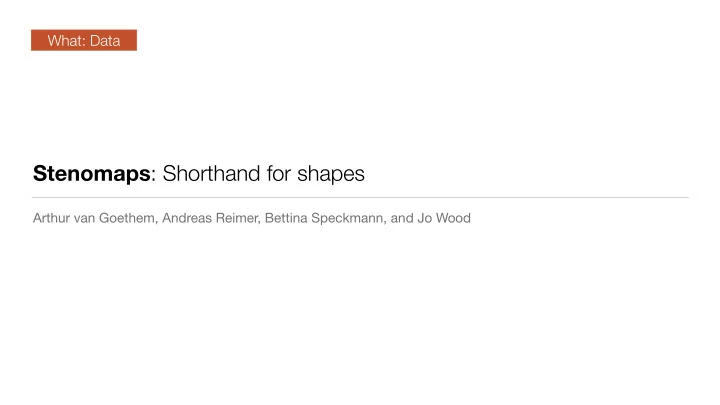

What: Data Stenomaps : Shorthand for shapes Arthur van Goethem, Andreas Reimer, Bettina Speckmann, and Jo Wood
Stenomaps Analogy with Stenography
What: Derived Area-to-line Transformation for Geometric Abstraction
Geometric Abstraction Generalized Boundaries Medial Axis France Stenomap Glyph
Why: Task Why Abstraction? Free up graphical space and distinct visual variables Direct attention to main data
Use Cases of Stenomaps
How: Encode Cartographic Lines Variation in Pattern and Width Not as limited as boundary lines
Energy consumption in the Regions of France, 2010
Why: Task Spatial Uncertainty Selective Perception Highlight main data by reduce geography Illusion of Accuracy Prevent inferences of exact location
Why: Task Cross-boundary Data Continuous Natural Phenomena Not tied to political boundaries Erroneous Perception Colour interpreted as uniform within each polygon Stenomaps: less intrusive Maintain continuity Give reference to location Allow comparison between maps Solar potential in Europe
Design Choices C 1 -continuous Hand-drawn appearance Few curves Low complexity Area vs Boundary A trade-o ff
4-step Algorithm Find feature points Obtain glyph region Find backbone Create glyph
Glyph Types Simple Locally intersecting Tree-based
Glyph Types Simple Locally intersecting Tree-based
Glyph Types Simple Locally intersecting Tree-based
Parameter Space
Strengths and Weaknesses • Simple, smooth • Recognizability • Efficient abstraction • Users must be familiar with the original geography • Represent both area and boundary • Inconsistency in the large parameter • Opportunities to expand the space cartographic design space • No user study Constraint: Only intended for tasks where exact boundaries are not needed
Scalability • If a map with borders looks reasonable, its second-level boundaries can likely be transformed with stenomaps. • Map of a continent: one stenomap for each country. • Map of a country: one stenomap for each province/state/region. • Generally, it is equivalent to up to 100 stenomaps per map. • Algorithm can adapt to produce the desired level of details in stenomaps.
Summary System Stenomaps What: Data Geometry: 2D borders in maps Area to line transformation, which converts a border to a line that What: Derived represents both the boundary and the area features. Present and enjoy the maps with less intrusive borders and without Why: Task inferences of exact location. Geotagged data can be encoded into the line as its width or colour, or the How: Encode data can replace the line by icons or text. How: Reduce Dimensionality reduction (area to line). Scale 100 stenomaps per map (generally equivalent to second-level boundaries).
Questions? Thank you.
Recommend
More recommend